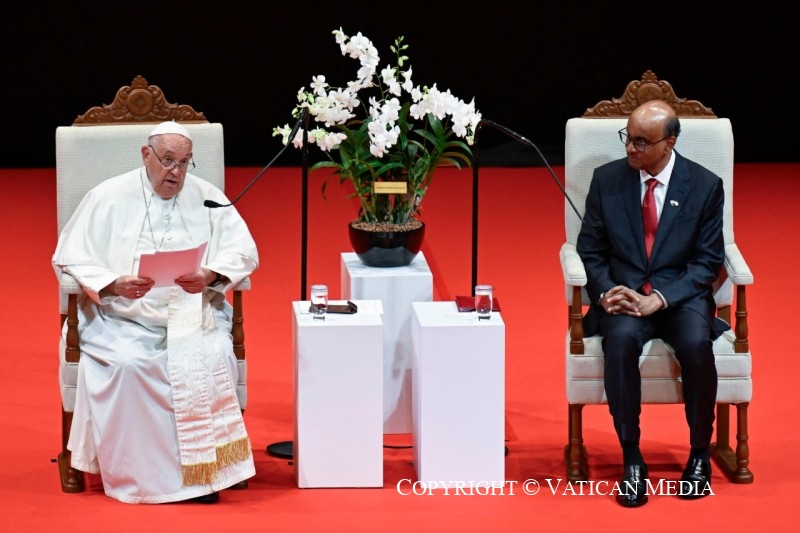From Singapore, Pope calls for inclusion of marginalized in progress
In his address to the authorities in Southeast Asia's commercial and financial crossroads, Francis extolled the model of peace and cooperation between different peoples that the city-state embodies. But he also called for a ‘fair wage’ for migrants and attention to family and human relations in the metropolis of the digital world. The model of a ‘multilateralism based on shared rules’ in today's conflict-torn world.
Singapore (AsiaNews) - A model of what the world can become where different peoples come together for the good of all. But - in the Singapore of ultra-modern skyscrapers and huge financial flows - also a warning not to stop at the pragmatism of efficiency and results, forgetting those who remain on the margins. Or - even worse - is forced to work in situations of semi-slavery to make the welfare of others possible.
This is the message that Pope Francis launched this morning from Singapore, in his first speech before the authorities, representatives of civil society and the diplomatic corps of the metropolis-crucible of South-East Asia, the last stop of his long apostolic journey in Asia and Oceania.
The pontiff spoke in the auditorium of the National University of Singapore, on a stage where was present a special new variety of orchid that the country had dedicated to him on the occasion of his visit. Next to him was President Tharman Shanmugaratnam, with whom he had a private meeting at Parliament House, before also meeting the young Prime Minister Lawrence Wong., who in May embodied the generational change at the helm of the city-state.
But significantly - later, at the St. Francis Xavier Retreat Centre, where he is currently residing - the pontiff also received former Prime Minister Lee Hsien Loong, the now 72-year-old son of Lee Kuan Yew, the ‘founding father’ of modern Singapore who led it from 1959 to 1990 and to whom Francis himself paid tribute in his speech, for the ‘strong impetus given to the country's rapid growth and transformation’.
‘A story of growth and resilience’, the pontiff called it, noting how Singapore ‘has not only prospered economically, but has strived to build a society in which social justice and the common good are held in high regard’.
In the shadow of its skyscrapers, however, there is no shortage of dangers that run through today's global economy: Pope Francis pointed in particular to ‘the risk that a certain pragmatism and exaltation of merit entail, namely the unintended consequence of legitimising the exclusion of those on the margins of the benefits of progress’.
The pope called for ‘special attention to be paid to the poor, to the elderly - whose labours laid the foundations for the Singapore we know today - and also to protect the dignity of migrant workers, who contribute so much to building society, and to whom a fair wage must be guaranteed’.
Francis also mentioned the lights and shadows of the new digital frontiers, another important face of today's Singapore: ‘The rapid developments in the use of artificial intelligence,’ he said, ‘cannot make us forget that it is essential to cultivate real and concrete human relationships; and that these technologies can be exploited precisely to bring us closer to one another, promoting understanding and solidarity, and not to isolate ourselves dangerously in a fictitious and intangible reality.
In all this, Singapore brings its unique experience of harmony between ethnic groups, cultures and religions: ‘The achievement and preservation of this positive inclusiveness,’ Francis commented, ‘is favoured by the impartiality of public authorities, engaged in a constructive dialogue with all, making it possible for everyone to make his or her own particular contribution to the common good and not allowing extremism and intolerance to gain strength and endanger social peace. Conditions, these, that have been ‘decisive for the success and stability achieved by Singapore, for a development that is not conflictual and chaotic, but balanced and sustainable’.
But it is a role, Pope Francis added, that Singapore is also called upon to play in the international order, which is threatened today by bloody conflicts and wars. ‘I rejoice that you have meritoriously promoted multilateralism and an order based on rules shared by all. I encourage you to continue to work for the unity and fraternity of the human race, for the common good of all’.
On this, the Pontiff pointed in particular to two areas: firstly, the role of the family, whose foundations today - he observed - ‘are being questioned and are in danger of being weakened’, while instead it must be able to continue to ‘transmit the values that give meaning and form to life and to teach young people to form solid and healthy relationships’.
He then spoke of the environmental crisis: ‘Your unique position,’ Francis told the Singaporean authorities, ‘gives you access to capital, technology and talent, resources that can drive innovation to take care of the health of our common home.
The city-state is a ‘shining example of what humanity can achieve by working together in harmony, with a sense of responsibility and with a spirit of inclusiveness and fraternity,’ the pontiff concluded. I encourage you to continue on this path, trusting in God's promise and his fatherly love for all.
26/01/2023 17:10







.png)










